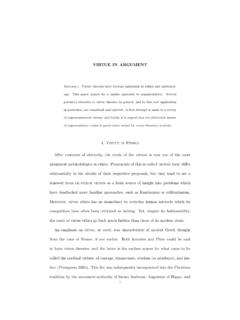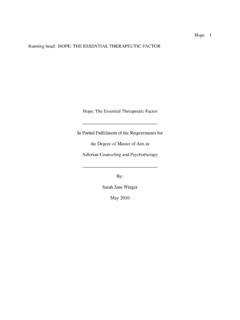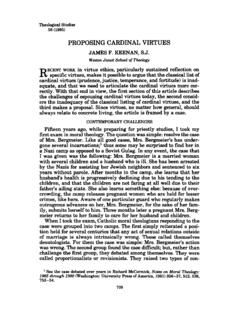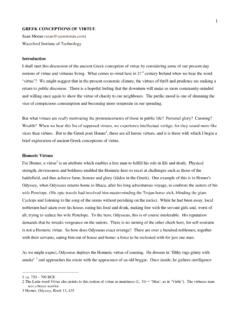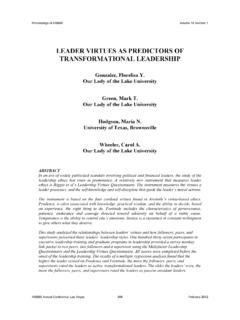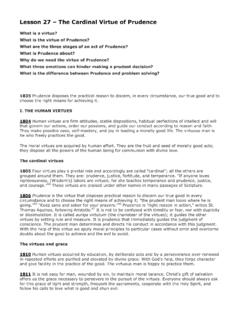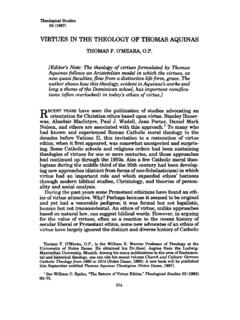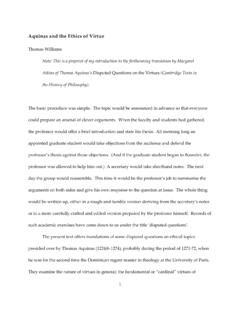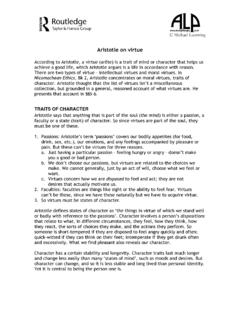Transcription of Virtue in Ethics - CAS
1 Virtue ARGUMENTATIONANDREW ABERDEINV irtue Ethics is perhaps the fastest growing field in ethical theory. Virtue theo-ries have also been proposed in other disciplines, such as epistemology and jurispru-dence. This paper stakes a claim in another area: in EthicsAfter centuries of obscurity, the study of the virtues is now one of the mostprominent methodologies in Ethics . Proponents of this so-called aretaic turn differsubstantially in the details of their respective proposals, but they tend to see arenewed focus on ethical virtues as a fresh source of insight into problems whichhave deadlocked more familiar approaches, such as Kantianism or , Virtue Ethics has an immediacy to everyday human interests which itscompetitors have often been criticized as lacking.
2 Yet, despite its fashionability,the roots of Virtue Ethics go back much further than those of its modern emphasis on Virtue , oraret e, was characteristic of Ancient Greek thoughtfrom the time of Homer, if not earlier. Both Socrates and Plato could be said tohave Virtue theories, and the latter is responsible for the so-called Cardinal virtues ,of courage, temperance, wisdom (or prudence), and justice (Protagoras330b). Thislist was subsequently incorporated into the Christian tradition by the successiveauthority of Saints Ambrose, Augustine of Hippo, and Thomas Aquinas. Howeverthe principal theorist of Virtue in (Western) philosophy is aristotle . Both of hismajor ethical works defend an account of the good life as an activity in accordancewith our highest virtues .
3 He catalogues many different ethical virtues . His earlierEudemian Ethics (1220b 1221a) lists gentleness; courage; modesty; temperance;righteous indignation; the just; liberality; sincerity; friendliness; dignity; hardiness;greatness of spirit; magnificence; and wisdom. A similar list may be found in thelaterNicomachean Ethics (1107a).A distinctive feature of aristotle s approach is his doctrine of the mean : thethesis that each Virtue represents the right degree of some property, of which eitheran excess or deficit would constitute vice. Hence every Virtue is situated betweena pair of opposite vices. For example, gentleness is the mean of irascibility andspiritlessness, and courage that of rashness and cowardice.
4 This doctrine providesa plausible analysis of at least some familiar virtues , but few if any modern virtuetheorists endorse it wholeheartedly. Nevertheless, the doctrine of the mean has asubstantial intellectual legacy. In particular, since the good agent must be able toknow what the mean is in any specific case, the doctrine obliged aristotle to de-velop his Ethics in an epistemological direction with the introduction of intellectualvirtues. These include knowledge, art, prudence, intuition, wisdom, resourceful-ness, and understanding (Nicomachean Ethics , Book VI). Chief amongst them isprudence, the traditional translation ofphronesis, which might better be rendered12 ANDREW ABERDEINas practical wisdom, or common sense.
5 For aristotle this is a disposition to de-liberate well, that is, so as to arrive at a course of action which brings about in EpistemologyIn recent years Virtue theory has not only undergone a resurgence in ethicalthought, but has spilled over into other philosophical disciplines, most conspicu-ously epistemology. As in Ethics , the aretaic turn in epistemology has been pro-moted as cutting through entrenched positions to provide new solutions to olddebates. In the epistemological case, these debates principally concern the defini-tion of such traditional concepts as knowledge, truth and justified belief. However,the proposed appeal to salutary intellectual virtues can take divergent forms. Dif-ferent Virtue epistemologists defend different sets of epistemological virtues .
6 Nor isthere consensus as to the precise role which the virtues should play in a reformedepistemology. They have been represented variously as possessing conceptual pri-ority over the traditional concepts, or as explanatorily but not conceptually prior,or merely as a reliable , there are two principal schools of thought within which most virtueepistemologists may be situated. The earlier of these, initially developed by ErnestSosa, is an offshoot of epistemological reliablilism, that is the thesis that knowledgemay be understood as the product of a particular sort of reliable process. In itsvirtue theoretic form the reliable process is characterized in terms of such virtues as sight, hearing, introspection, memory, deduction, and induction (Battaly, 2000).
7 By contrast, other Virtue epistemologists, particularly Linda Zagzebski, denythat such innate faculties qualify as virtues . Instead, her virtues are acquiredexcellences. She lists the ability to recognize the salient facts; sensitivity to detail;open-mindedness in collecting and appraising evidence; fairness in evaluating thearguments of others; intellectual humility; intellectual perseverance, diligence, careand thoroughness; adaptability of intellect; the detective s virtues : thinking ofcoherent explanations of the facts; being able to recognize reliable authority; insightinto persons, problems, theories; the teaching virtues : the social virtues of beingcommunicative, including intellectual candour and knowing your audience and howthey respond (Zagzebski, 1996, p.)
8 114). Elsewhere she also identifies intellectualcourage, autonomy, boldness, creativity, and inventiveness as virtues (Zagzebski,1996, pp. 220, 225). Although Zagzebski s list of virtues more closely resemblesAristotle s list of intellectual (or indeed moral) virtues , several of Sosa s virtuescould also be found on that list. Perhaps, as some commentators have argued(Battaly, 2000), a rapprochement between these ostensibly divergent schools in ArgumentWe have seen how Virtue theory has found proponents in both Ethics and episte-mology. This paper will argue that it is also a potentially rich and fruitful method-ology for informal logic. Our first step in this argument will be to address somerecurring problems which beset all Virtue theories ( , 1997, pp.
9 19 ff.).If these problems prove especially pernicious in the case of informal logic, we willhave shown that the methodology is poorly suited to its intended application. Con-versely, the provision of satisfactory answers should leave us well-placed to addressVIRTUE ARGUMENTATION3issues peculiar to argumentation. In the remainder of this section we shall explorelines of response to each of these first of these problems is one of justification: if argumen-tational virtues are to be understood as possessing normative force, where doesthat normativity come from? This is a problem for any foundational theory. Onecannot keep appealing to ever deeper foundations on pain of infinite regress. It isnot clear that Virtue theories, whether in Ethics , epistemology, or argumentation,are any worse placed than foundational theories of other kinds.
10 More specifically,the Virtue theorist can, as other theorists do, defend his position as coherent withour intuitions. Indeed, in so far as his virtues are familiar and intuitive, he is betterplaced to do this than many of his competitors. In the next section we shall seewhether there are familiar and intuitive argumentational virtues to be second problem arises from the observation that differentcultures or communities may subscribe to different conceptions of the ideal we are comfortable with this, we appear to sacrifice the traditional assumptionof logical universality; if not, how do we ground a common conception? Differentcultures endorse different virtues . In Ethics these can differ profoundly.
